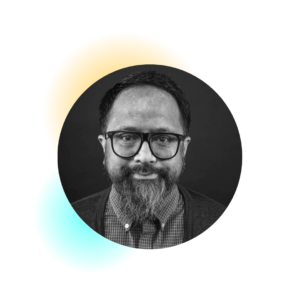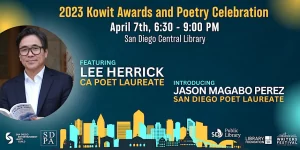 Interview with San Diego Poet Laureate Jason Magabo Perez by Tania Pryputniewicz
Interview with San Diego Poet Laureate Jason Magabo Perez by Tania Pryputniewicz
1) Congratulations on being chosen as San Diego’s second Poet Laureate! Can you tell us about the poetry journey that brought you to this role? How did you fall in love with poetry?
Thank you! It’s an honor to serve our communities in this way. I fell in love with my communities first. I fell in love with people fighting for justice and liberation first. Poetry arrived afterward. This was in college. Poetry presented itself to me as a way to process my thinking, my critique, my analysis, my love, my hurt. Then I began to understand that poetry had been with me, with us, all along—in how we communicated with one another, in how we expressed our love and rage, in how we made sense of our struggle, in how we practiced our joy. Once I realized that poetry was everywhere…in our music, our literature, our cultural practices, I fell in love again with language. I’ve studied and thought through poetry and poetics in informal and formal, institutional and counter-institutional spaces, at open mics, at poetry slams, in an MFA program, in a PhD program, at professional conferences, in digital space, in community organizing spaces, in libraries, in cafes, at my kitchen table. I come to this position enthusiastic about teaching, about collaboration, about experimentation, about practicing poetry through collective intervention.
2) What are your dreams for the community in this new role as SD Poet Laureate?
So many dreams. In addition to supporting local poetry efforts, I want to develop a youth poetry empowerment program that a) supports existing youth literacy, literary arts, performing arts, and media arts programming here in San Diego and b) plant the seeds for a sustainable center to support youth and affirm their complex, brilliant, complicated lived experiences and voices. I want to help move our poetry efforts toward a sustainable center for poetry here in San Diego. That center, that space, can be a place where we can coordinate our dream workshops, projects, collaborations, and outreach efforts. I know my term is only for two years, but I’ll keep dreaming!
3) Can you tell us about your forthcoming poetry collection, “I ask about what falls away?”
The first thing I’ll say is that it’s definitely still forthcoming, but we’re not sure who will publish it yet, nor are we sure when it’ll release. I’m currently looking for a new publisher and am optimistic that we’ll find a press soon. The book is basically a book-length poem that was mostly written at the kitchen table of my then-apartment in City Heights during the first wave of this pandemic. Sections of this poem are elegies. There is grief. There is critique. There is ethnic studies. There is love. There is struggle. There are the outsides of work. There are San Diego streets and alleys. In a one-word description, I would say: I ask about what falls away is an intimate grief manifesto against and underneath the daily violations of capitalism.
4) Any new projects or directions calling to you that you’d like to explore in your own poetry during the next two years?
Although I love books, l love chapbooks, I love pamphlets, I love the physicality of the book, I’m becoming more and more convinced of how limiting print can be. I’m really interested in thinking about poetry and poetics as a public intervention. This is not new and there are plenty of poets and artists who have been doing this work. I think I’m gathering the guts to craft installations, media interventions, and other forms of poetic possibility.





